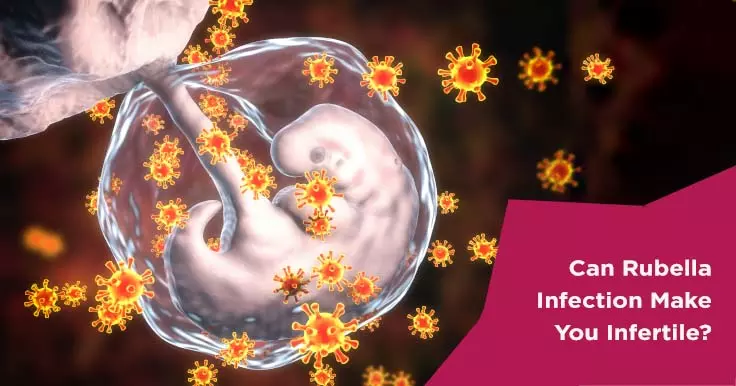Rubella Infection and Infertility: What You Need to Know

Rubella, also known as German measles is an infection that is caused by a virus. It causes mild symptoms resembling flu alongside a rash on the skin. It is contagious and is spread through the air when an infected person coughs or sneezes.
In most cases, Rubella infection is not dangerous. Some people might not even recognize that they are infected. However, it is extremely dangerous for an unborn baby if the mother gets Rubella infection while carrying the baby in the womb.
What are the Symptoms of Rubella?
Rubella usually has mild flu-like symptoms with a rash that lasts for about 3 days. The common symptoms of rubella include:
- Low grade fever
- Runny nose
- Red eyes
- Headache
- Joint pain
- Swollen joints
What is the Relation between Rubella Infection and Infertility?
Since rubella infection is extremely dangerous for unborn babies, women of childbearing age are advised to undergo rubella immunity testing before trying to conceive. If immunity cannot be established, they are asked to be vaccinated. Before infertility treatment, doctors will advise you to vaccinate for rubella due to the harmful effect it has on the unborn baby.
Pregnancy should be delayed for a period of 28 days after the mother is vaccinated against rubella. Since rubella causes a range of birth defects in babies, fertility specialists are extremely cautious about rubella immunity testing and vaccinating before they start the fertility treatment.
Problems in Pregnancy Caused by Rubella Infection
Below listed are some of the ways a rubella infection can affect:
- Congenital rubella syndrome- in this case, the baby will be born with more than one birth defect including problems for the heart, hearing, vision or intellect, liver and spleen damage or growth problems.
- Miscarriage- in this case, the baby has a chance to die in the womb before 20 weeks of pregnancy.
- Stillbirth- in this case, the baby can die after 20 weeks of pregnancy.
- Premature birth- in this case, birth can happen too early before reaching the full term of 37 weeks of pregnancy.
Consult a doctor if you are affected by the infection.
 Infertility Counselling
Infertility Counselling Female Infertility Treatment
Female Infertility Treatment Andrology Treatment
Andrology Treatment Fertility Enhancing Surgeries - Female
Fertility Enhancing Surgeries - Female Fertility Enhancing Surgeries - Male
Fertility Enhancing Surgeries - Male Endoscopy Treatment
Endoscopy Treatment IUI Treatment
IUI Treatment IVF Treatment
IVF Treatment ICSI Treatment
ICSI Treatment Advanced IVF Solutions
Advanced IVF Solutions Embryology
Embryology Vitrification Egg, Embryo, Sperm Freezing
Vitrification Egg, Embryo, Sperm Freezing Preimplantation Genetic Testing (PGT)
Preimplantation Genetic Testing (PGT) Donation Program Embryo / Egg / Sperm
Donation Program Embryo / Egg / Sperm Self-cycleTM IVF
Self-cycleTM IVF

 Self-cycleTM IVF
Self-cycleTM IVF









